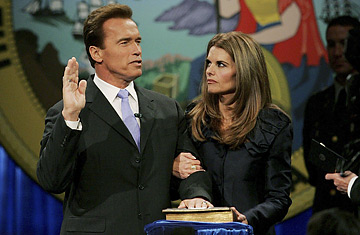
California governor Arnold Schwarzenegger is sworn in for second term as his wife Maria Shriver looks on January 5, 2007 in Sacramento, California.
After being sworn in on crutches for his second and final term as California governor today, Schwarzenegger is scheduled to outline a legislative agenda that includes corrections reform and new prison construction, additional spending on infrastructure projects, tougher environmental regulation, and a universal healthcare insurance proposal that includes coverage for children of undocumented workers. And judging from the early reactions, the stiffest resistance to many of those proposals likely will come from members of his own party.
"If you think about the possible obstacles to getting these things done this year, the word Democratic doesn't come to mind." says Fabian Nunez, state assembly speaker, who so far finds little to object to in Schwarzenegger's agenda. "We established a great working relationship with the Governor last year and I don't see why 2007 should be any different."
Republicans, on the other hand, are braced for battle. That plank adding the children of illegal immigrants to the healthcare plan? Doomed, they say. Costly programs that rely on new taxes or financial schemes that balloon the current $5 billion structural deficit? Forget about it. "To the extent that he wants to pursue an aggressive agenda that includes profligate spending, he's going to encounter lots of opposition from Republicans," says Jon Fleischman, publisher of FlashReport an online digest of poitical news, commentary and blogs targeted to the California G.O.P.
It's bad enough that Republican legislators have had to endure being the minority party in Sacramento for a decade. But it really stings that one of their own, who has been elected and re-elected to the state's highest office, sides with the opposition on so many issues. Last year, while powerless G.O.P. legislators quietly seethed, Schwarzenegger cut deals with Democratic leaders to push through laws raising the state minimum wage, providing low-cost prescription drugs to uninsured indigents and putting strict limits on greenhouse gas emissions. It showed voters that the Republican Governor could play well with Democrats. And after a stumbling 2005 in which he alienated voters on all sides of the aisle with his misguided government reform agenda, he subsequently sailed to re-election last November.
The Governor seems to mean it when he says he'll follow the same course this term. "He figured out that Californians want elected officials to cooperate, but this might also be the real Arnold Schwarzenegger," says Darry Sragow, a longtime Democratic strategist. One ceremonial move that has really irked Republicans: He tapped Democrat Willie Brown, a G.O.P. nemesis during his long reign as speaker of the state assembly, to emcee his inaugural festivities this weekend. His legislative wish list, particularly the tenets of his universal health insurance proposal, is a more serious sign. "It looks a lot like the plan I unveiled in December, so I'm thrilled," says Nunez, who wants to cover all children in the state and to ask employers and employees to pay a "fair share" of coverage costs.
Republicans insist they won't take it lying down this time around. They say they'll flex their power to block passage of spending items — which require a two-thirds majority in both houses that Democrats can't muster without their help — as a way to force themselves into the horsetrading sessions. Having received assurances from the Governor that deficit reduction is a priority and that he won't raise taxes, the G.O.P. has installed new statehouse leaders who say they intend to hold him to his word — and to keep him from completely caving to Democrats. "If we have common goals when we get to the table we will work with them," says Mike Villines, the assembly's new Republican leader. "But if we have disagreements, we'll have to disagree. Real bipartisanship is achieved when both party caucuses [make concessions to reach compromise], not when bills get passed with 41 Democratic votes and zero Republican votes."
Still, with speculation growing that Schwarzenegger has designs on a U.S. Senate seat after his term ends, observers say the Governor could have calculated that having conservatives balk at some of his more centrist policies isn't an altogether bad thing politically. "The next time his name will be on the ballot in California is going to be in a campaign for the U.S. Senate four or six years from now," says Dan Schnur, a former Republican strategist. "The more the conservatives do to push back at him, the more moderate he will look by comparison. As long as he doesn't raise taxes it's difficult to see a conservative candidate beating him in a primary, which means he's free to situate himself right at the political center."
